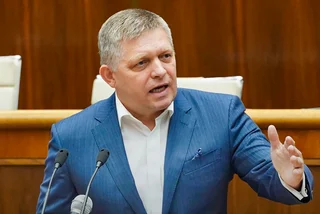Former Czech Prime Minister and opposition ANO leader Andrej Babiš extended his congratulations to Robert Fico for his victory in the Slovak parliamentary election this morning. Fico's Smer-Social Democracy (Smer-SD) party emerged with 23 percent of the vote in yesterday's election, well ahead of second-place party Progressive Slovakia, which finished with about 17 percent of the vote.
Babiš also congratulated the performance of the Hlas-Social Democracy party, led by Peter Pellegrini, which secured third place with approximately 15 percent of the vote. The parties led by Fico and Pellegrini, both former Slovak PMs, are likely to form a coalition to lead Slovakia moving forward.
"I wish all of Slovakia to have a government that will work for better lives for its people and staunchly protect the interests of all Slovak citizens within Europe," Babiš wrote on social media.
The former Czech PM refrained from commenting on the performance of Progressive Slovakia, led by Michal Šimečka, which finished second in the election. Before the elections, he expressed concerns about Progressive Slovakia on social media.
"Mr. Šimečka's Progressive Slovakia is the same as our Pirates. Welcoming migrants, legalizing drugs, higher taxes, lower pensions, and obedience to Brussels. I don't wish the same fate for the Czech Republic and Slovakia," Babiš previously stated.
Babiš served as the Czech Prime Minister from December 2017 to December 2021. His term overlapped with the final period of Prime Minister Fico's government, who led Slovakia until his resignation in March 2018.
Se Slovenskem nás pojà nejen hluboké historické vazby, blÃzkost, ale i přátelské vztahy na vÅ¡ech úrovnÃch.
— Petr Fiala (@P_Fiala) October 1, 2023
Sledoval jsem výsledky slovenských voleb a pÅ™eji Slovákům, aÅ¥ povolebnà vyjednávánà vedou k sestavenà dobré vlády. VěřÃm, že budeme na vládnà úrovni nadále úzce…
"We are connected to Slovakia not only by deep historical ties and proximity, but also by friendly relations at all levels," writes current Czech Prime Minister Petr Fiala in a diplomatic response to the election results this morning.
"I followed the results of the Slovak elections and I wish the Slovaks that the post-election negotiations lead to the formation of a good government. I believe that we will continue to work closely together at the governmental level for the benefit of both our countries."
2023 Slovak parliamentary election
Seven parties are set to enter Slovak parliament based on preliminary results. Fourth place went to the coalition Ordinary People and Independent Personalities (OLaNO), led by former Prime Minister Igor Matovič, which secured just over 9 percent of the vote. The conservative Christian Democratic Movement (KDH) received just below 7 percent, while the liberal Freedom and Solidarity (SaS) party of Richard Sulík garnered just over 6 percent. The Slovak National Party (SNS) is also expected to reach the parliamentary threshold.
Progressive Slovakia's Šimečka expressed respect for Smer-SD's victory but viewed it as a risk for Slovakia, and ruled out any cooperation with Fico in forming a government coalition. He noted that the next few days and negotiations between political parties will reveal the extent of this risk.
Pellegrini, meanwhile, spoke of potential cooperation with Fico's party in forming a government coalition. To achieve a majority in the 150-member parliament, these two formations would need to work another party. Milan Majerský, head of KDH, did not rule out negotiations with Smer-SD.
Slovak President Zuzana Čaputová confirmed that she will entrust the formation of the government to the election winner, who has the opportunity to secure majority support.
The Slovak Chamber of Deputies called for new elections after expressing a lack of confidence in Prime Minister Eduard Heger's government in December last year. This was preceded by the collapse of the four-member government coalition, which left the cabinet without a parliamentary majority. In May this year, Heger's government was replaced by a cabinet of experts led by economist Ľudovít Ódor, who did not run in the early elections.
Slovak newspapers expressed varying views on Fico's return to power. Some saw it as a shift in Slovak politics and a departure from the liberal ideals associated with the Velvet Revolution.
Others expressed concern about Fico's positions on military aid to Ukraine, which he has publicly vowed to stop, and Western sanctions against Russia. Despite his victory, Fico may face isolation in democratic Europe due to his rhetoric regarding the terms of peace in Ukraine.












 Reading time: 3 minutes
Reading time: 3 minutes 




























